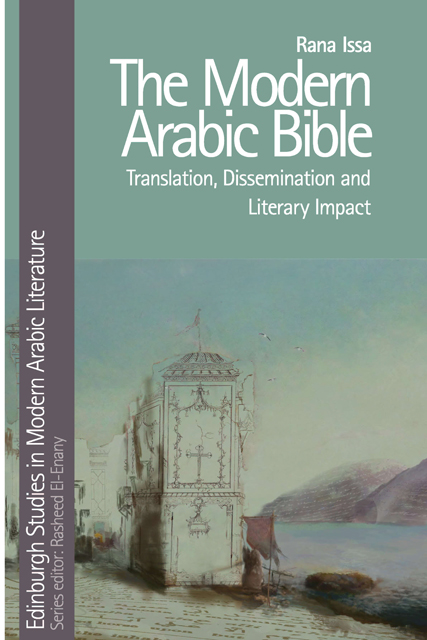Book contents
- Frontmatter
- Contents
- List of Figures
- Series Editor’s Foreword
- Acknowledgements
- Note on Transliteration and Abbreviations
- Dedication
- Introduction
- 1 The Missionary Bible
- 2 Bible Competition
- 3 Standardising Arabic
- 4 Butrus al-Bustani as Translator
- 5 Ahmad Faris Al-Shidyaq’s Bible as Literature
- Conclusion: In the Beginning was Translation
- Bibliography
- Index
2 - Bible Competition
Published online by Cambridge University Press: 02 June 2023
- Frontmatter
- Contents
- List of Figures
- Series Editor’s Foreword
- Acknowledgements
- Note on Transliteration and Abbreviations
- Dedication
- Introduction
- 1 The Missionary Bible
- 2 Bible Competition
- 3 Standardising Arabic
- 4 Butrus al-Bustani as Translator
- 5 Ahmad Faris Al-Shidyaq’s Bible as Literature
- Conclusion: In the Beginning was Translation
- Bibliography
- Index
Summary
The arrival of American missionaries in Beirut was a world apart from the pre-nineteenth century history of Bible translation. The American commoditisation of the Bible contested the authority of other religious communities and dragged them into the fray of competition. The Catholics were especially vexed with the Americans and identified them as the most dangerous contenders for Christian leadership. American zeal awakened the history of the Reformation and old seventeenth-century Catholic tricks like Bible burning, excommunication, and official complaints to the Ottoman and Western authorities were tried in this new context to little effect. To complicate matters for the Catholics, the Americans distributed a version based on the bilingual Arabic-Latin Catholic Bible from 1671, Biblia Sacra Arabica. American salesmanship and ardour, as well as their serious interest in educating the locals and converting them to their reading practices, qualified their competitive advantage.
Competition between the Catholics and the Protestants was not the product of the nineteenth century. But at this time, competition became a market force, wedded to a commodity, when in the past it had been embodied in religio-political rivalry over turf and over who has access to the production as well as to the reading of the Bible.
Competition between the Jesuits and Protestants in the nineteenth century took advantage of the emergent colonial political economy that favoured imported commodities over local labour. The spirit of free trade was spreading, and in the Ottoman Empire, it was inaugurated by the Balta Liman Agreement of 1838, with the emerging British colonialists. This agreement, like the Tanzimat edicts signed in the same year, facilitated the movement of American missionaries in the Levant, as members of the British millet, and thus protected by an agreement that allowed them to trade in the Empire. Describing the impact of this agreement on British and Ottoman political relations, Necla Geyikdağı writes that the agreement ‘conferred upon British merchants not only the status of “most favoured nation” but also that of ‘most favoured domestic merchants’. Through this agreement, the British were referred to as a millet, a term that legally recognised the group by the state, and was thus discreetly included alongside other millets (sects or nations), that resided within the Ottoman domains. The American missionaries, who counted as part of the British millet gained tremendously from the Balta Liman agreement.
- Type
- Chapter
- Information
- The Modern Arabic BibleTranslation, Dissemination and Literary Impact, pp. 81 - 108Publisher: Edinburgh University PressPrint publication year: 2023

